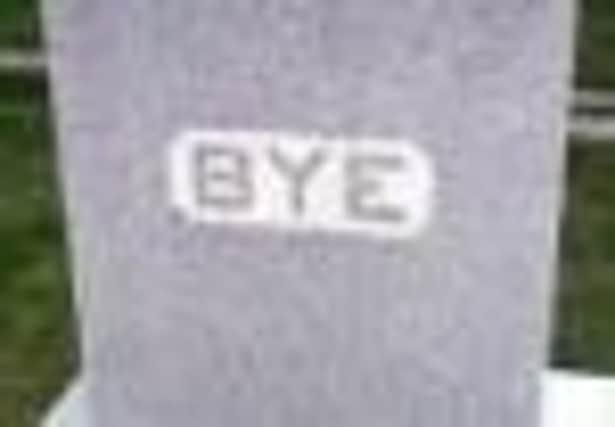Sandra Dick: Sometimes what matters most is having last word


YOU could call them the final word, the last say, the ultimate accolade or, indeed, the deadliest put-down. Whichever fits the bill, the person they refer to is not going to be in much of a position to answer back.
Epitaphs – from Spike Milligan’s famous “I told you I was ill” to the stinging inscription on the headstone of 102-year-old Canadian Ezekial Aiklee, “The good die young” – are words from beyond the grave that succinctly and sometimes rather scathingly sum up a life now lost.
Advertisement
Hide AdAdvertisement
Hide AdTypically penned in tribute by the poor deceased’s nearest and dearest, they’re how we’re remembered when we’re dead and buried – like it or not.
However, one funeralcare firm is attempting to wrest control over those crucial last words back to the person to whom they matter most, the dearly departed, with an offer to let customers choose and pay for their own headstone and inscription long before they leave this mortal coil.
The Co-operative Funeralcare says it means we can all dictate exactly how we want to be remembered, whether it’s simple words of goodbye to a more flamboyant, pertinent or, indeed, quirky reflection.
Certainly, a do-it-yourself epitaph might have been the ideal choice for poor Anna Hopewell – had she had the foresight to plan ahead. Her final resting place in Vermont ended up emblazoned with possibly the world’s least-sensitive epitaph: “Here lies the body of our Anna, done to death by a banana. It wasn’t the fruit that laid her low, but the skin of the thing that made her go.”
Or the equally insensitive epitaph on the headstone above road accident victim Jonathan Blake’s grave in Pennsylvania: “Here lies the body of Jonathan Blake, stepped on the gas instead of the brake.”
As for Harry Edsel Smith of Albany, New York, you can almost hear the crunch and squeal in his succinct epitaph: “Looked up the elevator shaft to see if the car was on the way down. It was.”
While bitterness oozes from the grieving author of Ellen Shannon’s epitaph on her gravestone in Girard, Pennsylvania: “Who was fatally burned, March 21, 1870, by the explosion of a lamp filled with RE Danforth’s Non-Explosive Burning Fluid.”
At least those reflections may raise a smile, perhaps the best therapy when mourning a much loved one’s loss.
Advertisement
Hide AdAdvertisement
Hide AdHowever, according to Bonnyrigg minister Rev John Mitchell, it may be best to play it safe with your epitaph.
“There’s the story of the woman organising her husband’s gravestone. She had to pay per letter, so kept it short: ‘Peter Reid, from Peterhead’. She was told she had enough money left if she wanted to say something else. ‘Aye,’ she said, ‘put in Ford Escort for sale’.”
A good tale that might not be 100 per cent true, but he recalls the real and unfortunate tribute to a young man at a North Lanarkshire cemetery: “The stone referred to him dying young but living life to full and for proof, it said, just look below . . . where stuck to the gravestone was an empty bottle of lager with a candle.
“Maybe his friends thought it was appropriate, but I’m not so sure.”
As for writing our own epitaphs, he warns there’s then the chance that we will simply opt to airbrush out the less-appealing elements of our nature.
“Best, perhaps,” he says, “to keep it simple and accurate.”
And, perhaps, avoid temptation to sound just a little pious. Take former Livingston MP Robin Cook, whose headstone lectures: “I may not have succeeded in halting the war, but I did secure the right of Parliament to decide on war.”
Leaving it to other people, though, is clearly fraught with danger. For some can’t resist temptation. Such as the tribute on one London gravestone, dated 1767: “Here lies Ann Mann, who lived an old maid but died an old Mann.” And, in a similar vein, the epitaph on John Penny’s headstone in Wimborne, which reads: “Reader if cash thou art in want of any, dig four feet deep and thou wilt find a Penny”. While the fiendishly smart words penned for Owen Moore, buried in Battersea in London read: “Gone away, owin’ more, than he could pay.”
Not that money matters when you’re six feet under, for death is life’s great leveller. That said, celebrities have a habit of monopolising the best epitaphs.
Advertisement
Hide AdAdvertisement
Hide AdTake American comedian Rodney Dangerfield, whose gravestone quips: “There goes the neighbourhood.” And feisty Hollywood actress Bette Davis, immortalised beneath the words: “She did it the hard way”.
What appeared above vampire actor Bela Lugosi’s grave had the potential to give us all the creeps. Relatives, however, resisted the temptation to emblazon his headstone with the words “Popped out for a bite”, instead his epitaph reveals his gentler, day-to-day side and reminds us of what’s really important in life: “Beloved father”.